- Home
- Lisa Smedman
Heirs of Prophecy Page 16
Heirs of Prophecy Read online
Page 16
Leifander’s bare feet were slimed with sewage that felt as though it had crept into every pore. He wriggled his toes and grimaced at the slippery feeling. He wished for a cool, cleansing rain, but the sky above was a flat, hot blue.
Ignoring the woman, he began to pray in his own language. The Winged Mother had sent one crow to him already. Perhaps she would send another. All he needed was one feather, then he wouldn’t have to worry about clothes or creeping about in an enemy city. He could just fly away.
“What’s that you’re chanting, Leifander? “the woman asked suddenly. “Is it an elven prayer? I’m a cleric, as well. I worship one of the elf goddesses, Hanali Celanil.”
Leifander snorted at her foolish prattle. A human claiming devotion to an elf deity? Ridiculous. He ran a hand in frustration through the tufts where his braids had been, concentrating on his prayer.
The woman didn’t take the hint. “Are you praying to Aerdrie Faenya?” she persisted. “Are you casting a spell?”
Angry, Leifander switched to the common tongue. “You’re interrupting,” he told her bluntly, then he realized what she’d just said.
This woman not only knew his name, she knew which goddess he worshiped. A suspicion suddenly dawned.
“Who are you?” he asked.
“Your sister,” the woman said, finally turning to meet his eye. “Your twin sister, Larajin.”
He stared at her a moment. So it was all true. He did have a twin sister. Yet she looked nothing like him, and her mannerisms were as crass and fumbling as any human’s. How could two people who shared the same womb have turned out to be such opposites? The gods must be laughing at the joke they had played.
“You don’t look like an elf,” he told her. “Or even like a half-elf.”
Her eyes flicked to his ears and the tattoos on his face and hands. “You don’t look like a half-elf either. I’d have sworn you were a full-blooded forest elf.”
“How did you know where I was?” he asked, changing the subject. “Why did that other human—Tal—come to rescue me?”
Her face colored. “I was the one who rescued you, with Tal’s help—and with Rylith’s. We were beside a stream, near the Standing Stone, and when I looked into one of its pools I saw—”
Leifander’s mouth dropped open. “You were with Rylith? Rylith of the Circle of the Emerald Leaves?”
“Why does that surprise you?”
Leifander shook his head. “Your father said you knew nothing of the forest elves—nothing about our people—until a few months ago. Why would one of the high druids of the sacred circle take you under her wing?”
“Our father, you mean,” she corrected him.
Leifander dismissed that with an impatient wave.
“Rylith says that twins with hazel eyes are favored of the gods,” she continued, “and that their birth is an omen of good fortune to come. You and I have a … a special destiny.”
Leifander merely nodded. Any child could have told him that. Who did this human think she was, to parrot back to him his own people’s lore? He frowned at the wall, not looking at her. Yet despite himself, he listened.
“Rylith says our half-sister Somnilthra prophesied that we would heal a great rift. Rylith says this rift is the one between human and elf—the one that led to this war.”
Leifander quickly turned his head. “The High Council has declared war?”
“Yes, but Rylith says there’s still time to stop it—some action that you and I can take that will prevent the war from happening. I must confess, I haven’t a clue what it might be.”
Leifander shook his head. “Why would we want to stop the war?”
That seemed to surprise her. It took Larajin a moment to find her voice. When she did, her tone was incredulous.
“Because … people will die.” When he shrugged, she quickly added, “And not just humans. The war could wipe out the forest elves and raze the forest.”
“Nonsense,” Leifander retorted. “The humans will never defeat us. They can’t even see in the dark. Some of us may fall, but the forest will remain ours forever.”
Above them, a wagon rumbled over the grate, then stopped, blocking the sunlight.
“Why don’t you care if there’s a war?” Larajin asked, her voice rising in exasperation. “There must be someone you love, someone you don’t want to see killed.”
Leifander lowered his eyes. “She’s already dead.”
It had been said in a whisper, more to himself than to Larajin, but she’d heard him nonetheless. Her expression changed in an instant.
“What happened?” she asked softly.
He glared at her. “Humans killed her. Red Plumes, from Hillsfar. She ventured too close to their city, and they tried to capture her for their ‘games.’ I’m told she died bravely, killing two of them before she herself was slain.”
Pride should have flared in his heart, but the pain was still too new. Chandrell had been his first love—worshiped from afar since she was a woman of fifty-eight years, and he a mere boy of twenty-one. Officially, he had yet to reach maturity, though the blood of a man already flowed hot in his veins. When she’d kissed him on the cheek after he’d done her a slight favor, he’d vowed to ask her to leap the bough with him, once he was at last old enough. He had prayed to his goddess that she would find no other lover before then.
Chandrell had been killed more than two years ago, but thinking of her still made his eyes sting. He’d succeeded in damping down his emotions all that time, but they squeezed out in the form of a single tear.
“I’m sorry,” Larajin said softly, “but it would seem your quarrel is with Hillsfar, not with Sembia.”
“It’s with humans!” Leifander snapped, angrily wiping the tear away. “They should all be put to the sword.”
“Then you might as well start with yourself,” she spat back. “Or at least, half of yourself.” She thrust a hand out, offering the magic dagger. “Here. Be my guest.”
Leifander knocked her hand aside. This stupid woman was missing the point. Humans—Sembians, specifically—started the war with their magical depredations upon the forest. They had been the ones to break the ancient pact, and now they had to pay. If it meant a war, so be it. The elves would give a good accounting of themselves. Even if they were outnumbered, they would be fighting in the forest, on their own terms. The forest would protect them—and they would protect it, in turn.
“Your people understand nothing of pride, of honor,” he told her. “That’s what this war is about. Our dignity!”
“This talk about ‘your people’ and ‘my people’ is nonsense,” she shouted back at him. “I’m a half-elf—and so are you!”
Leifander’s rebuke was cut short by a grating noise overhead. Looking up, he noticed that Tal had returned.
“By the gods, keep quiet!” he hissed down at them. “I could hear you halfway down the street.”
He lay prone on the road under the wagon and was reaching for something beside him. He found it, and passed a sack down to Larajin, who sheathed her dagger and waded forward to grab it. She opened it and began thrusting clothes at Leifander, not bothering to wait until he took them, just piling them on the ledge at his feet, together with a waterskin.
“Here,” she said tersely. “Wash the worst of the sewage off, and disguise yourself with these. Unless you’d rather let a mob drag you through the streets.”
Leifander picked up the nearest piece of clothing, a pair of white hose. Larajin was right, of course. If he was going to try to summon one of his feathered kin, he’d have a better chance of it away from the stinking sewer, and that meant going up onto the street. He had to pass as human, at least temporarily. He poured water over his legs and calves, rinsing off as much of the sewage as he could, then grudgingly yanked the hose over his wet feet. He put on a matching white doublet with sleeves slashed in gold and royal blue. There were leather gloves to cover his tattooed hands and black velvet slippers for his feet, and a gold turban set wi
th tinkling silver bells, that sat awkwardly on his ears. In order to get it to fit, he had to tuck the points of his ears inside it. He grimaced, feeling foolish, then picked up the last item of clothing—a scarf similar to the one that Tal had worn and obviously intended to serve the same purpose—and wrapped it around his face, hiding his tattoos. It smelled strongly of perfume—a welcome change from the sewer.
Tal grinned down from above. He was no longer wearing the scarf that had covered his own face. He looked like any other human, which made Leifander wonder what he’d been hiding.
“Not bad,” Tal said. “You look just like one of our—”
The wagon he was hiding under creaked as someone got into it, interrupting whatever he’d been about to say. Tal glanced back over his shoulder. From that direction came the sound of restless hooves against cobblestones.
“Let’s get moving,” he hissed, extending a hand down through the hole where the grate had been.
Leifander took it and allowed Tal to help him climb out of the sewer. He wriggled out onto his belly—soiling the fresh white clothes on the dirty cobblestones—and a moment later was joined by Larajin. The wagon above rolled away justas Tal slid the grate back into place. Suddenly exposed, the three lay at one edge of a crowded street.
There were humans everywhere—nobles strutting along with parasols to shade themselves from the late afternoon sun, peddlers pushing carts filled with rattling wares, gilded carriages rattling past, and throngs of humans carrying packages, boxes, and sacks, winding their way through the crowd. No one seemed to pay the slightest attention to the three “humans” who had appeared on the road after the wagon pulled away, though one or two did wrinkle their noses as they passed, no doubt smelling Larajin’s filthy boots. As Tal, Larajin, and Leifander stood, brushing themselves off, only one or two heads turned. After a few brief, puzzled frowns they turned away, more concerned with going about their own business than satisfying idle curiosity.
“Come on,” Larajin said, taking Leifander’s arm. “My friend has a perfume shop, just a little down the road. We can hide there until we figure out how to get out of the city.”
Leifander shook off her hand. Remembering his manners, he pressed a hand to his heart and gave her a brief bow.
“I thank you for helping me escape,” he said, “despite the fact that had you arrived a moment later, I would have accomplished an escape on my own.”
Ignoring Larajin’s skeptical look and Tal’s snort of disbelief, he continued, “I do not require any further assistance. We may share the same parents—” At this, Tal’s eyebrows rose—“but that puts you under no obligation. Good-bye.”
He turned to go, but Larajin caught his arm a second time.
“Th-the prophecy!” she sputtered. “The war.” She glanced at Tal with troubled eyes, as if expecting him to lend his voice. “Rylith says we’re the only ones who can stop it. She’s a druid—a fellow elf. If you won’t believe me, surely you’ll believe her.”
Beside her, Tal was looking increasingly nervous.
“Uh, Larajin,” he whispered. “People are listening.”
It was true. At the mention of the word “elf,” more than one head had turned. Their argument was starting to attract attention, but Leifander didn’t care. Exhausted from his long battle with the rats, itching in the hot clothes, still smelling of the sewer, and with the gods-cursed bells on the turban tinkling in his pinched ears, he’d had enough. He wanted to be rid of the two humans, to get away on his own somewhere where he could summon a crow, skinwalk, and launch himself into the clean blue sky and be quit of the stinking city.
“Larajin,” Tal whispered again. “If we stand here and argue, the guards might see us. If he wants to leave, let him.”
“Tal, it’s not that simple,” Larajin pleaded. “I have to make Leifander understand. If there’s war, you’ll…” She hesitated, blinking back tears. “The elves will kill you.”
Now people were stopping and staring. “Elves?” one noblewoman asked in a fluttering voice.
“Should we call the guard?” a man asked, looking nervously around.
“They’re just talking about the war,” another muttered, shaking his head and walking on.
“That’s right,” Tal said quickly. “Nothing to get alarmed about. We’re just—” Whatever else he had to say was drowned out by the rumble of a passing carriage.
Leifander was feeling claustrophobic again, hemmed in by the crush of people in the street. Tal and Larajin might have been trying to help, but they were only drawing unwanted attention.
“Black Archer pierce you both!” he hissed, yanking his arm out of Larajin’s grasp.
Larajin’s face paled. “Take it back!” she cried. “You’ve cursed him—take it back.”
Leifander touched his forefinger to his lips through the fabric of the scarf, then flicked the curse up toward the heavens. “No.”
“Take it back!” Larajin said again, in a high, tight voice.
Stubbornly, Leifander shook his head.
“Gods curse you!” she screamed, lunging at him and slamming both palms into his shoulders.
Taken by surprise, Leifander tripped backward over the curb. He fell heavily but sprang to his feet a moment later. Only when he heard the gasps of the crowd that had formed a circle around them did he realize what was wrong. His turban had been jostled off when he fell. The crowd was staring at his ears, their faces frozen in horror.
The silence broke. “An elf!” one man howled. “A spy! Call the guard!”
Pandemonium broke out all around them. People collided with one another, some scrambling to get away, others struggling to draw daggers or swords and lunge forward. Still others turned with gallant concern as the noblewoman who had spoken earlier fainted, crumpling slowly to the ground in a heap amid her skirts.
Leifander spun, looking for an exit, but found none. He thrust out his hands, tattooed fingers splayed, then remembered at the last moment that he was unable to skinwalk. Nearly weeping with frustration, he wished for a feather—just one tiny black feather—so that he could fly.
Then Larajin spoke, in a tone he had not heard her use before. She sang out a single word in a voice as sweet as song, vibrant and pure. “Calm. Be calm, everyone!”
Amazingly, it worked. All around them, the crowd jerked to a sudden halt, and slowly limbs and faces relaxed. Leifander felt his own body relax as a feeling of peace settled upon him like the sweet languor found at the bottom of a bottle of wine. At the same time, a wonderful fragrance filled the air. After a moment, he recognized it as the scent that accompanied the winter-blossoming Hanali’s Heart. He noticed the heart-shaped locket hanging from a red cord around Larajin’s wrist. It was glowing a dusky amber color.
Maybe she really did draw her magic from an elf goddess.
Tal seemed unaffected by the spell—or perhaps he was merely quick witted. He stepped forward and laid a hand on Leifander’s shoulder. With only the slightest of winks, he turned to the crowd.
“This man is a spy,” he told them. “He serves Sembia.” He thumped a hand against the House Uskevren emblem on his surcoat. “He’s half human and part of my company. Anyone who wants to challenge him will have to take it up with my commander, Master Ferrick.”
The name seemed to carry some weight. More than one sword slid back into its scabbard, but one man, a portly noble in a maroon doublet and hose, wasn’t satisfied.
“What about the woman?” he asked. “She’s awfully slender. Is she a halfie, too?”
Fear caused Larajin’s eyes to widen, but otherwise she kept her composure. “I’m as human as you are,” she told the noble, then she yanked the scarf from her head, shaking her hair back from her ears. “Look here—do you see any points?”
Grudgingly the noble shook his head. His was the last challenge. The crowd seemed to believe Tal’s bluff. People were already starting to disperse.
The glow surrounding Larajin’s locket faded, and the scent of flowers vanis
hed from the air.
“Come on,” Tal muttered. “Let’s get out of here.”
Leifander, seeing the wisdom in this suggestion, scooped up his turban and pulled it back on, making ready to follow. Once he was away from the crowd, on a quiet street, he could try again to summon a crow.
Larajin, however, was slower to react. She stood in place, eyes glistening, whispering what sounded like a prayer.
“Hanali Celanil, forgive me,” she said. “I did not mean to deny my heritage.”
With a heavy sigh, she turned to follow them.
CHAPTER 9
So that’s it, then,” Larajin said. “You’re leaving. You’re not even going to try to help.”
Leifander squatted on the second-story balcony of Kremlar’s perfume shop, stroking the glossy black feathers of a crow. The bird had come to his whispered prayer as faithfully as a hound to a horn, then it had plucked a downy feather from its breast and offered it to Leifander.
“There’s nothing we can do,” he answered as he took the feather from the crow.
“Not separately, no,” Larajin conceded, “but Rylith said that together—”
“You are a Sembian,” Leifander said, “and I belong to the Tangled Trees.”
That seemed to be all that he was going to say. Leifander dismissed the crow, which took off into the dusk with a loud caw. He undid a strand of the braid that hung down his back, and lashed the feather securely to it with a length of fine embroidery thread Kremlar had given him.
Larajin turned to Tal, but he only shrugged. “I don’t see how the pair of you could stop the war,” he said. “It’s inevitable. The armies are mobilizing; the militia from Ordulin is already on the march to—”
He stopped abruptly, remembering there was an elf present. Deliberately turning his back on Leifander, he strode to the far end of the balcony and stared up at the evening sky. Sunset painted the western sky a dusky yellow-red; the clouds looked as though they contained a smoldering fire.

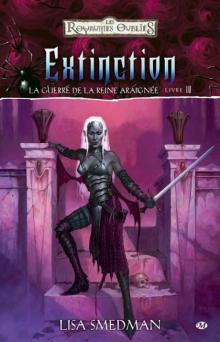 Extinction
Extinction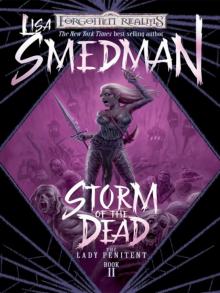 Storm of the Dead
Storm of the Dead Blood Sport
Blood Sport The Lucifer desk (s-2)
The Lucifer desk (s-2)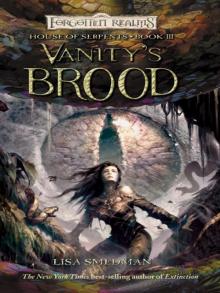 Vanity's Brood
Vanity's Brood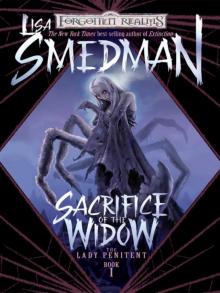 Sacrifice of the Widow
Sacrifice of the Widow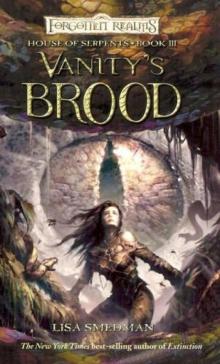 Vanity's brood hos-3
Vanity's brood hos-3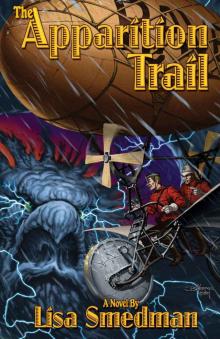 Apparition Trail, The
Apparition Trail, The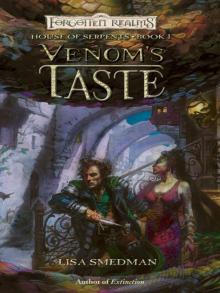 Venom's Taste
Venom's Taste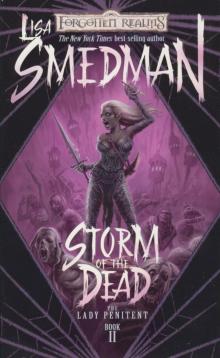 Forgotten Realms - The Lady Penitent - Storm of the Dead
Forgotten Realms - The Lady Penitent - Storm of the Dead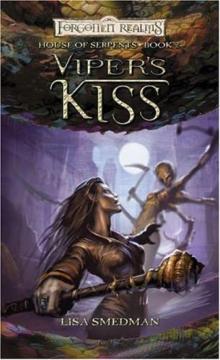 Viper's kiss hos-2
Viper's kiss hos-2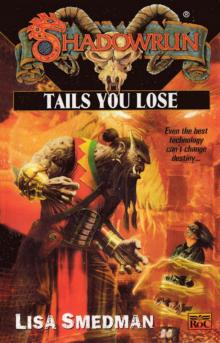 Tails You Lose
Tails You Lose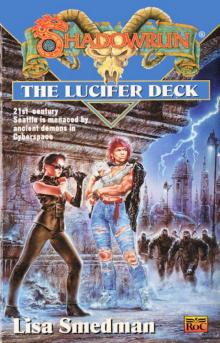 The Lucifer Deck
The Lucifer Deck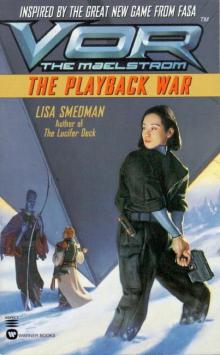 Vor: The Playback War
Vor: The Playback War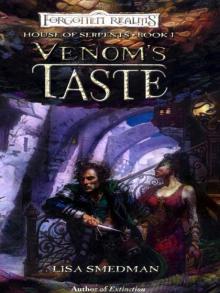 Forgotten Realms - House of Serpents 1 - Venom's Taste
Forgotten Realms - House of Serpents 1 - Venom's Taste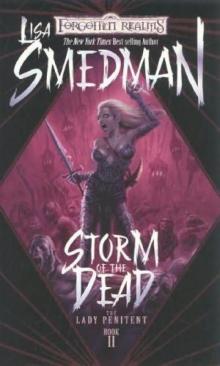 Storm of the Dead зкp-2
Storm of the Dead зкp-2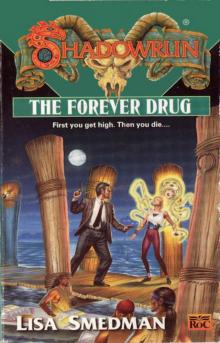 The Forever Drug
The Forever Drug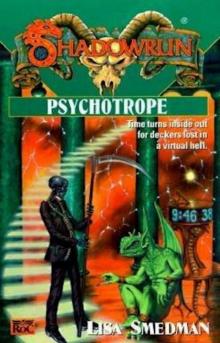 Psychotrope
Psychotrope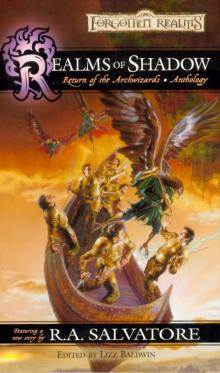 Realms of Shadow a-8
Realms of Shadow a-8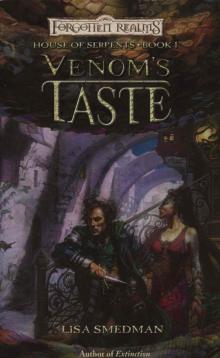 Venom’s Taste hos-1
Venom’s Taste hos-1 Psychotrope s-33
Psychotrope s-33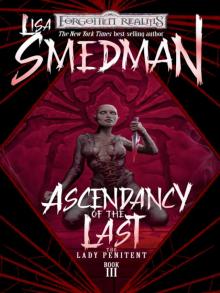 Ascendency of the Last
Ascendency of the Last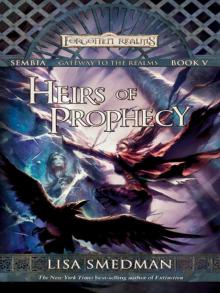 Heirs of Prophecy
Heirs of Prophecy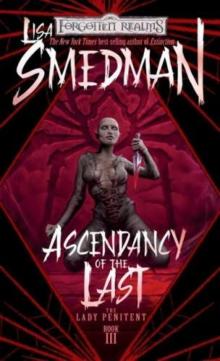 Ascendancy of the Last зкp-3
Ascendancy of the Last зкp-3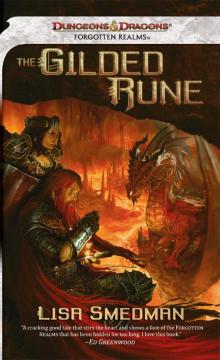 The Gilded Rune (forgotten realms)
The Gilded Rune (forgotten realms)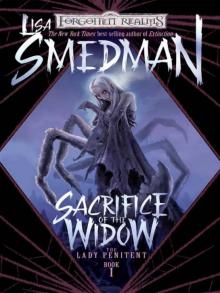 Sacrifice of the Widow: Lady Penitent, Book I
Sacrifice of the Widow: Lady Penitent, Book I The Lucifer desk s-23
The Lucifer desk s-23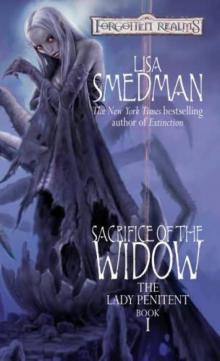 Sacrifice of the Widow lp-1
Sacrifice of the Widow lp-1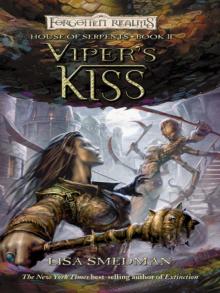 Viper's Kiss
Viper's Kiss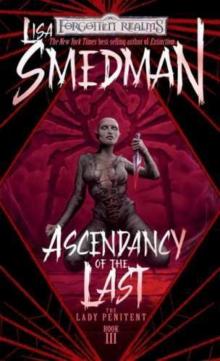 Forgotten Realms - The Lady Penitent - Ascendancy of the Last
Forgotten Realms - The Lady Penitent - Ascendancy of the Last